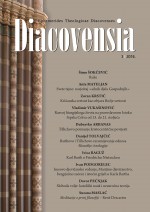KRIVNJA, KAJANJE I POMIRENJE U KONCEPTUALNOJ PERSPEKTIVI SVETOGA PISMA I KRŠĆANSKIH DENOMINACIJA
GUILT, REPENTANCE, AND RECONCILIATION IN THE CONCEPTUAL PERSPECTIVE OF THE SCRIPTURES AND CHRISTIAN DENOMINATIONS
Author(s): Dubravko TuralijaSubject(s): Christian Theology and Religion, Biblical studies, Other Christian Denominations
Published by: Katolički bogoslovni fakultet u Đakovu
Keywords: Deuteronomistic theology; spiritual and corporal works of mercy; sin; Catholics; Christianization; guilt; punishment; LXX; forgiveness; repentance: reconciliation; Orthodox; Protestants;
Summary/Abstract: Defining the concepts of guilt and punishment in the morphological and Patristic context is in collision with the Deuteronomistic notion of repentance and forgiveness, which was crystallized through the LXX theology in the New Testament. In the context of Old Testament theology, there is no ultimatum for forgiveness. Jesus’ imperative of forgiveness is unconditional and absolute because the concepts of guilt and punishment have mutated through the history of salvation. In the Patristic Period, guilt and punishment had dominated, while in the Deuteronomistic period, guilt and punishment mutated in repentance and forgiveness. Finally, in the New Testament, forgiveness is given a central place. Unconditional forgiveness is the hallmark of the New Testament and must be interpreted in this context. The New Testament principle is that the righteous man should convert the sinner, unlike the Old Testament principle where the righteous would move away from the sinner. Among the Christian denominations, there are also differences in the interpretation of forgiveness. The Catholic interpretation differs from the Orthodox and Protestant which insist on repentance, while Catholic theology emphasizes mutual forgiveness, viewing repentance more as a process, and not just as an act. While reconciliation in the Old Testament relates to reconciling man to God, in the New Testament reconciliation between God and man exists in the reciprocity of mutual reconciliation between man and man.
Journal: Diacovensia: teološki prilozi
- Issue Year: 24/2016
- Issue No: 4
- Page Range: 521-537
- Page Count: 17
- Language: Croatian

